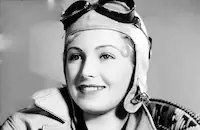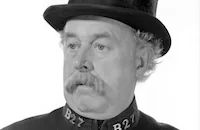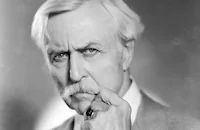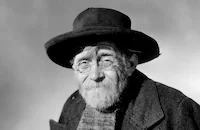Music in the Air

Brief Synopsis
Cast & Crew
Joe May
Gloria Swanson
John Boles
Douglass Montgomery
June Lang
Al Shean
Film Details
Technical Specs

Synopsis
In the Bavarian mountains, schoolteacher Karl Roder is in love with pretty Sieglinde and writes songs with her father, Dr. Walter Lessing. At a town festival, Karl and Walter introduce their new song, which goes over so well with the townsfolk that they give Walter the village funds with which to go to Munich. They hope that Walter will be able to reunite with his old friend, Ernst Weber, now a famous agent and music publisher, and interest Ernst in publishing the song. Karl also goes to Munich with his mountain climbing group, and when he arrives, he goes to Ernst's office, where he meets Frieda Hotzfelt, an opera prima donna, and Bruno Mahler, a libretto writer. Frieda and Bruno enjoy a jealous, volatile relationship, and when Karl arrives, they have just had a fight about whether Frieda will sing in Bruno's new opera. Frieda is taken with handsome Karl, as Bruno is with Sieglinde when she and her father arrive. Ernst agrees to put Walter and Karl's song in the new show, and that afternoon, Bruno and Frieda woo their respective naïve victims. After Bruno and Frieda fight again, Freida refuses to sing in the show then tries to convince Karl to run away with her to Venice. Tired of Frieda's confusing sophistication, Karl sneaks out of her hotel room to find Sieglinde, who tells him that Bruno has arranged for her to take Frieda's place as the opera's prima donna. Karl tries to convince her that Munich is no place for simple folk like them, but Sieglinde assumes that he is disparaging her talent and refuses to leave with him. Weeks later, at a dress rehearsal of the opera, Ernst, Bruno, the conductor, Hans Uppmann, and Kirschner, the director, agree that Sieglinde is simply awful in the role and must be replaced by Frieda, who has secretly been rehearsing with Hans. Karl, who has come back to Munich after missing Sieglinde to the point of distraction, overhears their decision and tries to warn her, but she refuses to believe him and tells him to leave. She is crushed when Hans tells her that she lacks the necessary experience and style, and Walter, too, is severely disappointed when Hans says that, even though Walter's song may remain in the opera, his orchestration will be replaced. They return to their village full of sorrow and shame, but later, when the opera's opening night is broadcast on the radio, the entire village celebrates when they hear Walter's song. Ernst confirms that the song is a big hit, and both couples happily reunite.

Director
Joe May
Cast

Gloria Swanson

John Boles

Douglass Montgomery

June Lang
Al Shean

Reginald Owen

Joseph Cawthorn

Hobart Bosworth

Sara Haden
Roger Imhof
Jed Prouty

Christian Rub

Fuzzy Knight

Marjorie Main
George Chandler
Ferdinand Munier
Grace Hayle
Otto Fries
Torben Meyer
Otis Harlan
Herbert Heywood
Lee Kohlmar
Jean Olmes
George Ernest
Henry Hanna
Ann Howard
Betty Jane Graham
Adolph Dorr
Perry Ivins
Frank Austin
Juan Martinez
Carlos De Valdez
Frederick Vogeding
Perry Mansfield
Allen Mathews
John Mcavoy
James Notaro
Mollie Peck
Wilma Roelof
Beverly Royde
Katharine Snell
Jean Seal
Rose Tyrell
Loie Tilton
Margaret Fitzpatrick
Eddie Foy
Emily Fitzpatrick
Ted Doner
Dixie Dean
Patsy Daly
Bob Crosby
Bud Carpenter
Jimmie Cushman
Mildred Claire
Peanuts Banks
Marie Burton
Kay Barnes
Bill Brande
Harry Blake
Crew
Don Anderson
William Conselman
Joe Cunningham
William Darling
Louis De Francesco
Jack Donohue
Oscar Hammerstein Ii
Betty Heistand
Renè Hubert
Jerome Kern
Robert Liebmann
Robert Mack
Joe May
Dave O'brien
Ernest Palmer
Erich Pommer
Erich Pommer
A. L. Von Kirbach
Franz Waxman
Billie Wilder
Howard I. Young

Film Details
Technical Specs

Articles
Music in the Air
Joe May, in fact, had been directly responsible for getting Wilder to America in the first place. When May departed Germany in 1933, he immigrated directly to Los Angeles, becoming a producer at Columbia Pictures, while Wilder moved to Paris. Wilder kept in touch, sending May his screenplays; one of them prompted May to entice Columbia to pay for Wilder's move to the United States. When that script was not produced, Wilder went to Mexico so he could return to the U.S. on a new visa. By this time, May had moved to the Fox Film studio and was partnering with Erich Pommer on Music in the Air, which they hired Wilder to co-write.
The script was an adaptation of an operetta by Jerome Kern and Oscar Hammerstein III that had opened on Broadway in 1932 and run for 342 performances -- a witty, romantic trifle set in Bavaria. One of the actors from the Broadway production, Al Shean, was imported for the film version to reprise his role as Dr. Walter Lessing, launching him on a ten-year run in Hollywood as a character actor. Shean was a famous vaudeville artist and also the great-uncle of the Marx Brothers, for whom he wrote much of their early material.
But the main star of Music in the Air was Gloria Swanson, the (at the time) twice-Oscar-nominated silent screen star whose film appearances were growing fewer and farther between. She was no longer a major draw, however, and this picture -- a major Christmas release that opened at Radio City Music Hall -- was a flop. Swanson announced her retirement but returned to movie theaters seven years later in the RKO comedy Father Takes a Wife (1941). After nine more years, she made a stunning, Oscar-nominated comeback with her most famous movie, Sunset Blvd. (1950), in which she was directed by Billy Wilder, who by now had evolved into one of the top writer-directors in the business. (Following Sunset Blvd., Swanson appeared sporadically in films and television shows for another fifteen years.)
Despite its commercial failure, Music in the Air received some good reviews, with The New York Times deeming it "a skillfully photographed work which includes among its ballads, songs, and snatches some of the most distinguished melodies of this cinema season... Miss Swanson makes an agreeable return to the screen as the prima donna. The years have not scarred her loveliness, and in addition she possesses a pleasing voice and a gift for light comedy."
According to Swanson biographer Tricia Welsch, a heavy iron object fell onto Swanson's head one day during filming, knocking her out, and "Fox exploited the accident for publicity purposes, extolling Gloria's gameness."
A few months after the release of this picture, Fox Film Corporation merged with Twentieth Century Pictures to form 20th Century-Fox.
By Jeremy Arnold

Music in the Air
Quotes
Trivia
Notes
This film marked the screen debut of Al Shean, who had appeared in the Broadway cast of the operetta Music in the Air. The picture was the first Hollywood film of German director Joe May. It was also the first film Billy Wilder (who spelled his first name Billie at the time) worked on in the United States, although two earlier Hollywood films were based on German films that he had written. According to a Hollywood Reporter news item, Columbia had intended to produce a screen version of the operetta in 1933. Hollywood Reporter news items also reported that Fox borrowed Irene Dunne from RKO in late June 1934 for the lead opposite John Boles, and that the studio considered Nelson Eddy and Phillips Holmes for roles in the picture. According to the Twentieth Century-Fox Records of the Legal Department at the UCLA Theater Arts Library, Fox originally intended to produce the film in English, French and German with Dr. Ludwig Berger as the director. According to an December 8, 1933 Hollywood Reporter news item, Fox intended to make the picture in France. Producer Erich Pommer, who was in charge of European production for Fox, came to Hollywood when the project was relocated there, and it was his first picture in the United States since 1927. For more information about Pommer, please for Liliom. The legal records also note that Walter Reisch was contracted to provide an adaptation and continuity of Music in the Air, but his contribution to the completed film has not been confirmed.
According to the legal records, Twentieth Century-Fox considered remaking the picture in 1943 as a starring vehicle for Sonia Henie, and again in 1959 with Elvis Presley as the star. Neither of these films were made, however. According to Swanson's autobiography, Fox built a Bavarian village and reproductions of the Munich zoological garden and opera house on their lot. She also states that Fox hired Dr. Marifiotti, Enrico Caruso's voice coach, to help her prepare for the film. Swanson did not make another picture until the 1941 RKO production Father Takes a Wife, which co-starred Adolphe Menjou.
















